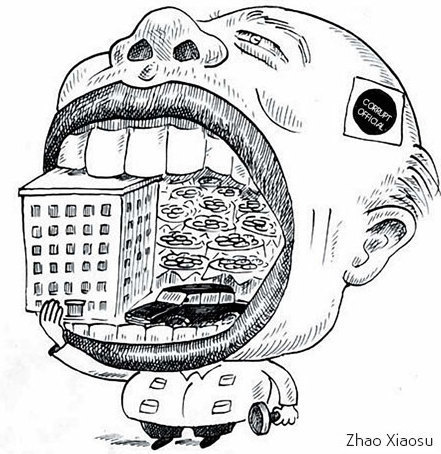
|
BIZCHINA> Insights
 |
|
Busting the bribe tribe
By Cao Li (China Daily)
Updated: 2009-08-20 14:50
 As investigations into the alleged Rio Tinto bribery scandal continue, many executives and officials within China's steel and other industries will be feeling hot under the collar. With many more expected to be implicated, experts say the arrests of four Shanghai-based employees of the multinational mining giant - including Australian citizen executive Stern Hu - on charges of stealing commercial secrets have highlighted a common business practice that is spinning out of control. A lack of systematic supervision has been blamed for a "bribe culture" that has flourished in China's rapidly developing economy, while the heads of many State-owned enterprises (SOEs), which still dominate the most profitable sectors, are believed to be its biggest champions. In the past two months alone, two bosses of SOEs have been severely punished for taking bribes. Chen Tonghai, former chairman of China Petrochemical Corporation (Sinopec), was given a suspended death sentence in July for accepting birbes of more than 195 million yuan ($28 million), while Li Peiying, former chief of Capital Airports Holding Company (CAH), was executed on Aug 7 for taking 26 million yuan and misappropriating 82.5 million yuan. Kang Rixin, general manager of the China National Nuclear Corporation (CNNC), is also reportedly under investigation over a 1.8-billion-yuan corruption scandal. "Corruption is ingrained in SOEs, so SOE leaders don't see taking money as a problem," said Meng Ting, an experienced lawyer with Jinque Law Firm in Beijing . "They also accept brand cigarettes, bottles of quality wine, cars and even luxury villas." "And just look at how many send their children abroad to be educated or are already running businesses themselves," added Wu Dong, a Shanghai lawyer with the M&A Law Firm, who has years of experience in mergers between foreign and Chinese companies. A picture published on an Sina.com, a major Internet news portal, last year appeared to show Zhou Jiugeng, a government official in Nanjing, Jiangsu province, smoking cigarettes that cost 180 yuan a pack and wearing a watch worth 100,000 yuan. The vitriol it sparked led to a probe into his dealings and his detention this year for allegations of taking bribes.
"The recent outbreak of high-profile cases shows the nation's determination to deal with the problem. However, it also highlights the prevalence of corruption in Chinese business circles and that the amount these people are accepting in bribes is drastically increasing," said Zhuo Zeyuan, a political law professor for the Party school of the Central Committee of the Communist Party of China (CPC). "There are plenty of rules to regulate SOE bosses, government departments to watch SOE assets and profits, as well as an increasing number of random inspections to check operations. But none of them work." Local offices of the central State-owned assets supervision and administration (SASAC) were launched in 2003 and are charged with tracking assets and carrying out random audits to ensure correct operational procedures are being followed.
When allegations of corruption arise, however, the matter then comes under the responsibility of the disciplinary and juridical systems. "But when lots of departments are supposed to be watching for wrongdoing, it usually ends up that none of them do the job efficiently," explained Zhao. "Also, corruption is usually only discovered after huge losses to public funds have already been made because anti-corruption is not a feature of the daily management of SOEs." Hu Xingdou, an economics professor at the Beijing Institute of Technology, agreed. He added: "SOEs have independent supervisors; they have board directors and work unions, who are both expected to oversee the management teams. But they seem to be only for decoration and offer no real use. "Leaders even spend lots of money on hiring professionals to draw up internal regulations to prevent corruption. But they can invalidate all of them with just one order." Xue Lan, deputy chairman of the school of public policy and management at Tsinghua University in Beijing, added the system is also being held back by SOE bosses often having administrative ranks that are higher than the government officials charged with supervising them. In the pyramid of power at SOEs, the chairman is king. "They have the power to employ millions with one signature, so people are not surprised by the amount of bribery that goes on, even if it totals millions or hundreds of millions," said Zhang Peihong, a lawyer representing one of the four arrested Rio Tinto employees. Chen, the ex-chairman of Sinopec, had earned himself a reputation for his arbitrary and despotic exercise of power and, before his downfall, was once famously quoted as saying: "The 1 or 2 million yuan I spend socializing in a month is a piece of cake compared with the 20 billion yuan my firm brings to the State in taxes every year. You can't make money unless you know how to spend it." (For more biz stories, please visit Industries)
|
||||||
主站蜘蛛池模板: 亚洲欧美激情精品一区二区 | 亚洲欧美精品一区二区 | 亚洲成人黄色网址 | 99久久精品费精品国产一区二 | mm在线视频免费看 | 亚洲综合色吧 | 国产a级三级三级三级 | 国产精品2020 | 亚洲男人第一天堂 | 国产一区亚洲二区三区 | tom影院亚洲国产日本一区 | 综合成人在线 | 亚洲精品二区中文字幕 | 国产精品视频网址 | 丰满老熟女毛片 | 欧美一级手机免费观看片 | 欧美在线观看成人高清视频 | 中文字幕有码在线播放 | 久久久成人啪啪免费网站 | 日韩欧美中文字幕一区二区三区 | 亚洲a级片在线观看 | 久久午夜影视 | 国产成人精品免费视频大全可播放的 | 特黄特a级特别特级特毛片 特黄特黄 | 日本高清色本在线www | 中国人免费观看高清在线观看二区 | 久久99久久精品国产只有 | 成人三级在线观看 | 久久性妇女精品免费 | 99re6热视频精品免费观看 | 亚洲综合图片人成综合网 | 亚洲伦乱 | 色青青草原桃花久久综合 | 亚洲一区二区在线 | 欧美激情视频一级视频一级毛片 | 欧美精品在线视频观看 | 亚洲欧美在线视频 | 欧美成人 综合网播九公社 欧美成人26uuu欧美毛片 | 亚洲系列中文字幕一区二区 | 国产成人欧美一区二区三区的 | 成年人免费网站视频 |